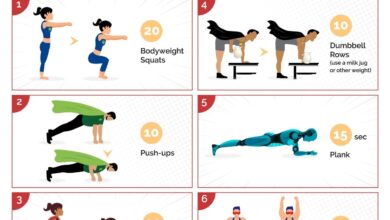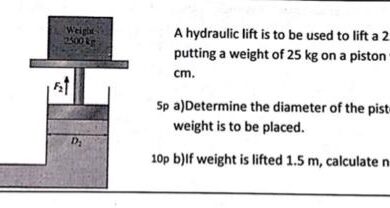
5 Non-Scale Goals That Are Better Than Weight Loss
5 non scale goals that are better than weight loss – 5 Non-Scale Goals That Are Better Than Weight Loss – It’s time to ditch the number on the scale and embrace a more holistic approach to health and happiness. We’re often told that weight loss is the ultimate goal, but what if we told you that focusing on non-scale goals can actually lead to a more fulfilling and sustainable lifestyle?
This isn’t about ignoring your physical health, but rather shifting your focus from a singular number to a broader understanding of well-being. This means prioritizing strength, flexibility, mental clarity, healthy habits, and celebrating progress along the way. Think about it: what truly matters – feeling strong and energized, having a clear mind, or simply fitting into a smaller size?
Beyond the Scale: 5 Non Scale Goals That Are Better Than Weight Loss

Stepping away from the tyranny of the number on the scale is a liberating journey towards a more holistic understanding of health and well-being. While weight loss has long been the dominant goal in the pursuit of a healthier lifestyle, it often overlooks the multitude of other factors that contribute to a truly fulfilling and vibrant life.
Non-Scale Goals: A Comprehensive Approach to Well-being
Focusing solely on weight loss can be detrimental to our overall well-being, leading to unhealthy obsessions, disordered eating, and a distorted view of our bodies. Instead, embracing a broader perspective that encompasses non-scale goals allows us to prioritize factors that contribute to a truly healthy and happy life.
- Increased Energy Levels:A primary indicator of overall health is how much energy we have to engage in life. By focusing on improving our diet, sleep, and exercise habits, we can experience a significant boost in our energy levels, enabling us to pursue our passions and enjoy life to the fullest.
- Improved Mood and Mental Clarity:A healthy lifestyle that prioritizes nutrition, exercise, and stress management can significantly improve our mood and mental clarity. Regular physical activity releases endorphins, which have mood-boosting effects, while a balanced diet provides essential nutrients for optimal brain function.
- Enhanced Strength and Flexibility:Strength and flexibility are crucial for maintaining mobility, preventing injuries, and improving overall physical function. By incorporating strength training and flexibility exercises into our routines, we can build a strong and resilient body that can withstand the challenges of daily life.
- Improved Sleep Quality:Sleep is essential for physical and mental recovery, and it plays a vital role in maintaining our overall well-being. By prioritizing good sleep hygiene, we can improve the quality and duration of our sleep, leading to increased energy, improved mood, and enhanced cognitive function.
Focusing on non-scale goals like increased energy, better sleep, and improved mood can be much more rewarding than solely chasing the number on the scale. And when it comes to making healthy choices, don’t forget about those delicious leftovers! Check out 5 ways turn last nights leftovers mornings breakfast for some creative ideas.
By prioritizing these non-scale goals, you’ll find yourself on a path to a healthier and happier you.
- Reduced Risk of Chronic Diseases:A healthy lifestyle that includes a balanced diet, regular exercise, and stress management can significantly reduce the risk of developing chronic diseases such as heart disease, stroke, type 2 diabetes, and certain types of cancer.
Strengthening Your Body
Beyond the scale, focusing on strengthening your body is a fantastic way to improve your overall health and well-being. This means moving your body in ways that build muscle and enhance your functional fitness. It’s about building a strong foundation that allows you to move with ease and confidence in your everyday life.
Functional Fitness
Functional fitness is about training your body to perform everyday activities with ease and efficiency. It focuses on movements that mimic real-life actions, improving your strength, stability, and coordination. A well-structured functional fitness program can include exercises that target major muscle groups, emphasizing compound movements that engage multiple muscle groups simultaneously.
- Squats:This exercise strengthens your lower body, including your quads, glutes, hamstrings, and calves. It also improves your balance and core stability.
- Lunges:Lunges are another excellent exercise for building lower body strength and improving your balance. They also target your core and hip flexors.
- Push-ups:Push-ups are a great compound exercise that works your chest, shoulders, and triceps. They also engage your core for stability.
- Pull-ups:Pull-ups are a challenging exercise that targets your back, biceps, and forearms. They also improve your grip strength and overall upper body strength.
- Rows:Rows are a versatile exercise that can be done with various equipment. They target your back muscles, including your lats, rhomboids, and traps. Rows also strengthen your biceps and forearms.
Flexibility and Mobility Exercises
Flexibility and mobility are crucial for maintaining a healthy body. Flexibility refers to the range of motion in your joints, while mobility focuses on the ability to move through that range of motion efficiently and pain-free.
Instead of fixating on the number on the scale, focus on goals that truly matter. Feeling stronger, having more energy, and being able to keep up with your kids are just a few examples. A great way to build strength and improve your core is with the 21 day strong abs program , which can help you achieve those non-scale goals and feel amazing in your own skin.
- Stretching:Stretching helps improve your flexibility and range of motion. It can also help prevent injuries by increasing blood flow to your muscles and reducing muscle stiffness.
- Yoga:Yoga is a great way to improve your flexibility, strength, and balance. It also promotes mindfulness and relaxation.
- Pilates:Pilates focuses on strengthening your core muscles and improving your flexibility and posture. It can also help with pain management and injury rehabilitation.
Types of Exercise and Their Benefits
| Type of Exercise | Benefits | Non-Scale Goals |
|---|---|---|
| Strength Training | Increased muscle mass, improved bone density, boosted metabolism, enhanced strength and power | Improved body composition, increased energy levels, enhanced confidence, reduced risk of injuries |
| Cardiovascular Exercise | Improved heart health, reduced risk of chronic diseases, weight management, increased endurance | Improved sleep quality, reduced stress levels, enhanced mood, increased stamina |
| Flexibility and Mobility Exercises | Improved range of motion, reduced muscle stiffness, increased blood flow, enhanced posture | Reduced risk of injuries, improved balance, enhanced coordination, increased comfort and ease of movement |
| Mind-Body Exercises | Stress reduction, improved sleep, increased mindfulness, enhanced emotional well-being | Improved mental clarity, enhanced self-awareness, reduced anxiety and depression, increased resilience |
Nourishing Your Mind

Our mental health plays a crucial role in our overall well-being. A healthy mind is not just about the absence of mental illness; it encompasses a sense of peace, resilience, and the ability to thrive in life’s challenges. Just as we nourish our bodies with healthy food, it’s equally important to nourish our minds with practices that promote mental well-being.
Instead of solely focusing on the number on the scale, consider setting 5 non-scale goals that reflect your overall well-being. These could include things like increased energy levels, improved sleep, or better mood. If weight loss is a desired outcome, check out these 4 sustainable ways to lose weight without fad diets for a healthier approach.
Remember, sustainable changes are about creating a lifestyle that supports your overall health and happiness, not just a temporary fix.
Strategies for Managing Stress and Anxiety
Stress and anxiety are common experiences in today’s fast-paced world. Chronic stress can have detrimental effects on our physical and mental health, leading to various health issues. Fortunately, there are effective strategies for managing stress and anxiety.
- Mindful Breathing:Taking slow, deep breaths can help calm the nervous system and reduce feelings of anxiety. Focusing on the breath can help shift attention away from anxious thoughts.
- Regular Exercise:Physical activity releases endorphins, which have mood-boosting effects. Exercise can also help reduce stress hormones and improve sleep quality.
- Connecting with Nature:Spending time in nature has been shown to reduce stress levels and improve mood. Even a short walk in a park can have a positive impact.
- Cognitive Behavioral Therapy (CBT):CBT is a type of therapy that helps individuals identify and challenge negative thought patterns and behaviors that contribute to anxiety.
Benefits of Mindfulness and Meditation Practices
Mindfulness and meditation practices involve focusing attention on the present moment without judgment. These practices have been shown to have numerous benefits for mental and physical health.
- Reduced Stress and Anxiety:Mindfulness and meditation can help regulate the stress response system, reducing feelings of anxiety and promoting a sense of calm.
- Improved Focus and Concentration:By training the mind to focus on the present moment, these practices can enhance attention span and improve cognitive function.
- Increased Emotional Regulation:Mindfulness can help individuals become more aware of their emotions and develop skills for managing them effectively.
- Enhanced Self-Awareness:Through mindful observation, individuals gain a deeper understanding of their thoughts, feelings, and bodily sensations.
Building Healthy Habits
Building healthy habits is an essential aspect of overall well-being. It goes beyond simply achieving a specific weight goal and focuses on creating sustainable lifestyle changes that promote both physical and mental health. By incorporating these habits into your daily routine, you can cultivate a more balanced and fulfilling life.
Designing a Weekly Meal Plan
Creating a weekly meal plan that prioritizes nutritious foods and enjoyable eating experiences is a crucial step towards building healthy habits. This approach ensures you are consistently fueling your body with the nutrients it needs while also making healthy eating a pleasurable and sustainable part of your life.Here are some tips for designing a balanced and enjoyable weekly meal plan:
- Incorporate a variety of nutrient-rich foods:Include plenty of fruits, vegetables, whole grains, lean protein sources, and healthy fats in your meals and snacks. This variety ensures you are getting a wide range of essential vitamins, minerals, and fiber.
- Plan for meals and snacks:This helps prevent impulsive choices and ensures you have healthy options readily available. You can plan your meals around your schedule and activities, making it easier to stick to your plan.
- Include enjoyable meals:Don’t be afraid to experiment with new recipes and flavors. This keeps eating healthy exciting and prevents boredom. Explore different cuisines and cooking methods to discover new dishes you enjoy.
- Prepare meals in advance:This saves time and energy during the week. You can batch cook certain meals or prep ingredients ahead of time to make it easier to cook healthy meals throughout the week.
- Allow for flexibility:It’s important to be flexible with your meal plan. Don’t be afraid to adjust it based on your needs and preferences. Life is unpredictable, and having a flexible approach allows for easier adaptation.
Improving Sleep Quality and Creating a Consistent Sleep Schedule, 5 non scale goals that are better than weight loss
Adequate sleep is essential for overall health and well-being. It allows your body and mind to rest and repair, contributing to improved mood, energy levels, and cognitive function. Establishing a consistent sleep schedule and incorporating healthy sleep habits can significantly improve your sleep quality.Here are some tips for improving sleep quality and creating a consistent sleep schedule:
- Establish a regular sleep schedule:Go to bed and wake up around the same time each day, even on weekends, to regulate your body’s natural sleep-wake cycle.
- Create a relaxing bedtime routine:This could include taking a warm bath, reading a book, or listening to calming music. Avoid screen time for at least an hour before bed, as the blue light emitted from electronic devices can interfere with melatonin production.
- Optimize your sleep environment:Make sure your bedroom is dark, quiet, and cool. Use blackout curtains or an eye mask to block out light, and consider using earplugs or a white noise machine to minimize noise.
- Avoid caffeine and alcohol before bed:Caffeine and alcohol can disrupt sleep patterns. Avoid consuming them in the hours leading up to bedtime.
- Get regular exercise:Regular physical activity can improve sleep quality, but avoid exercising too close to bedtime.
Promoting Energy Levels and Vitality
Healthy habits contribute to increased energy levels and vitality. By focusing on nourishing your body, mind, and spirit, you can feel more energized and vibrant throughout the day.Here are some healthy habits that promote energy levels and vitality:
- Hydrate regularly:Dehydration can lead to fatigue and decreased energy levels. Aim to drink plenty of water throughout the day, especially before, during, and after exercise.
- Eat nutrient-rich foods:Consuming a balanced diet that includes plenty of fruits, vegetables, whole grains, and lean protein sources provides your body with the energy it needs to function optimally.
- Get regular exercise:Physical activity boosts energy levels and improves overall health. Aim for at least 30 minutes of moderate-intensity exercise most days of the week.
- Manage stress:Chronic stress can deplete energy levels and affect overall health. Incorporate stress-management techniques into your daily routine, such as meditation, yoga, or spending time in nature.
- Get enough sleep:Adequate sleep is essential for feeling refreshed and energized. Aim for 7-9 hours of quality sleep each night.
Concluding Remarks
The journey to a healthier and happier you doesn’t have to be defined by a number on a scale. By embracing non-scale goals, you can unlock a world of possibilities that extend far beyond weight loss. Focus on building strength, nourishing your mind, and cultivating healthy habits.
Remember to celebrate your progress, big or small, and embrace the journey. You’ll find that true well-being comes from within, and it’s a journey worth taking.






